外研版小学英语语法总复习知识点归纳教案资料
(完整word版)外研版小学英语语法总复习知识点归纳

(完整word版)外研版小学英语语法总复习知识点归纳外研版小学英语语法总复知识点归纳一、时态1.一般现在时(1)表示经常发生的动作或事情,通常用“usually通常,often常常,every…每…。
sometimes有时,always总是,”等词。
(2)基本结构:主语I / You / We / They /He / She / It肯定句:主语+动词原形或动词第三人称单数形式否定句:主语+don’t + 动词原形或者doesn’t + 动原一般疑问句(Yes/No) Do…。
Yes。
I do.No,I don’t.Does…(动词原形)…?Yes,he/she does。
No,he/she doesn’t.特殊疑问句What do …。
How does she…(动词原形)…?(3)动词第三人称单数方式(同名词单数酿成复数办法不异)1.普通情形+s如:walk-walks2.辅音字母+y结尾去y +ies fly-flies3.结尾是s。
x,sh。
ch +es watch-watches4.结尾是0 +es do-does。
go-goes5.特殊have-has2.现在进行时(1)表示正在发生的动作,通常用“now现在。
look看,XXX听”.(2)根本方式: be +动词-ingeg: I am(not) XXX.You/We/They are(not) reading。
He/She/It is(not) eating.What are you doing。
Is he reading?(3)动词的目前分词方式(动词+ing)普通情形+ing walk—walking末端是不发音的e-e+ingcome—coming重读闭音节双写末了一个字母+ingswim-swimming。
run-running3.一般过去时(1)表示过去已经发生的事情,通常用“last …上一个…。
just now刚才,many years ago许多年前,XXX昨天”等词。
外研社小学英语知识点归纳
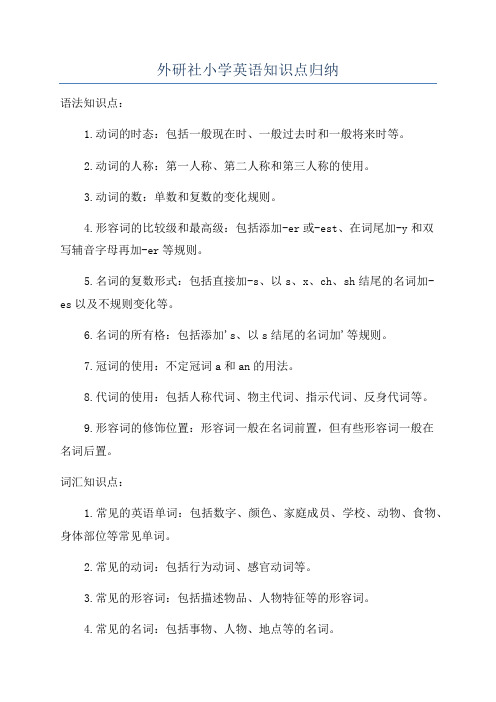
外研社小学英语知识点归纳语法知识点:1.动词的时态:包括一般现在时、一般过去时和一般将来时等。
2.动词的人称:第一人称、第二人称和第三人称的使用。
3.动词的数:单数和复数的变化规则。
4.形容词的比较级和最高级:包括添加-er或-est、在词尾加-y和双写辅音字母再加-er等规则。
5.名词的复数形式:包括直接加-s、以s、x、ch、sh结尾的名词加-es以及不规则变化等。
6.名词的所有格:包括添加's、以s结尾的名词加'等规则。
7.冠词的使用:不定冠词a和an的用法。
8.代词的使用:包括人称代词、物主代词、指示代词、反身代词等。
9.形容词的修饰位置:形容词一般在名词前置,但有些形容词一般在名词后置。
词汇知识点:1.常见的英语单词:包括数字、颜色、家庭成员、学校、动物、食物、身体部位等常见单词。
2.常见的动词:包括行为动词、感官动词等。
3.常见的形容词:包括描述物品、人物特征等的形容词。
4.常见的名词:包括事物、人物、地点等的名词。
5.常见的副词:包括表示时间、地点、方式等的副词。
6.常见的连词:包括连接句子、词组、并列和对比等的连词。
句子结构和表达:1.陈述句的构成和基本结构:主语+谓语+宾语。
2.疑问句的构成:包括一般疑问句、特殊疑问句等。
3.否定句的构成:一般在谓语动词前加not。
4.祈使句的构成:以动词开头,表示命令或请求。
5.感叹句的构成:以助词what或how开头,表示惊讶、赞美、遗憾等情感。
6.常见的句型:包括There is/are, I can/can't, I like/don't like等常见句型。
阅读技巧:1.辨别词义:通过上下文理解词义。
2.理解句意:通过关键词和句子结构等推断句意。
3.找主题句:通过段落的第一句或总结句等找到段落的中心思想。
4.理解标题:通过预测段落内容和文章整体思路等理解标题含义。
5.寻找信息:通过关键词、答案选项等快速找到问题的答案。
外研版小学英语册知识点复习及语法

外研版小学英语1~8册学问点复习及语法第1册主要内容1、26个字母〔听、说、读、写过关〕:A B C D E F G H I J K L M N O P Q R S T U V W X Y Za b c d e f g h i j k l m n o p q r s t u v w x y z词汇:boy girl door window blackboard bird desk chair red blue yellow green black dog cat cap panda one two three four five six seven eight nine ten eleven twelve school teacher bag pencil pen book cake kite mother father grandpa grandma sister brother doctor driver policeman nurse farmer head arm leg foot nose eye mouth ear句子:1----Good morning! ----Good morning!2----Good afternoon! ----Good afternoon!3----How are you ----I’m fine, thank you.4----What’s your name ----I’m …. / My name is ….----Point to the door/window/blackboard…..----Stand up/ Sit down, please.----What colour… ----It’s red/blue….5----How many …----One/Two/Three….6----What’s this/that ----It’s a chair/desk…----Happy birthday! ----Thank you.---- Here’s your present/cake. ----Thank you.7----How old are you ----I’m nine.8----Is it a cat ----Yes, it is. / No, it isn’t.----Where’s the cat ---I don’t know./ It’s in the green bag.9---- This is my father.----He/She’s a doctor/nurse…. \10---- This is his/ her arm/head….第2册主要内容词汇:song toy car ship doll animal monkey tiger lion elephant big small fat thin tall short sport football basketball table tennis riding bikes swimming skipping meat rice noodles fish milk banana pear orange apple Chinese Maths Science Music Art PE play sleep sing give eat Christmas spring summer autumn winter hot warm cool cold sunny windy dress coat sweater T-shirt bike bus walk in on under park词组:get up go to school have lunch go home watch TVgo to bed have breakfast have dinner Spring Festival New Year fly kites go to work by bus by bike go fishing句子:My favourite toy is a car/ doll….1 ----What’s this/that ----It’s a tiger.2 ----What are they ------ They’re lions.3 I like/ don’t like football/ basketball….I like/ don’t like swimming/skipping….4----Do you like meat ----Yes, I do./ No, I don/t.5----Does Daming/he/ she like bananas -----Yes, he does./ No, she doesn’t.I get up at seven o’clock.----What’s the time, please ---- It’s half past seven.----What do you do at the weekend ----- I play football.----What does he/she do at the weekend ---- He/ She watches TV.Happy New Year.It’s spring/ summer/ autumn/ winter.6 ---It’s warm/hot/cool/cold in spring/summer/ autumn/ winter.I’ve got a new book.7----Have you got a new book--- Yes, I have. / No, I haven’t.----Has Tom/he/she got a new book ----Yes, he/she has. / No, he/she hasn’t.8 ---Amy/ He/ She goes to school by bike/ by bus/by car.I t’s in/ on/ under the desk….第3-4册主要内容一、情境问答:第三册1. Have you got_______ Yes, I have. No, I haven’t.2. Excuse me. Where’s the________, pleaseGo straight on. Turn right. Turn left.3. What are you doing I’m _______What is he/she doing He’s/She’s ___________What are they doing They’re __________4. Do you want some _______ Yes, please. No, thank you.5. Can you _____ Yes, I can. No, I can’t.6. What are you going to do I’m/We’re going to _______7. Can I have some ______ Yes, you can. Sorry, you can’t.8. How many ____ are there in ____ There is/are______第四册9. Is it _____ Yes, it is. No, it isn’t.10. Will you _____ Yes, I will. No, I won’t.11. Was he/she/it _____ Yes, he/she/it was. No, he/she/it isn’t.Were you ______ Yes, I was. No, I wasn’t.12. Did you/he/she/they____ Yes, I/he/she/they did. No, I/he/she/they didn’t.二、词组短语第三册take pictures watch TV read a book make a cake write a letter listen to music talk to my friend do the high jump play with in the park look at do the long jump row a boat under the tree play chessplay football play basketball play table tennis第四册have a picnic go swimming go to the park do homework speak English 情景运用:第三册1. 问路、指路Excuse me. Where’s the _______, pleaseGo straight on. / Turn left. / Turn right.What are you doing I’m _______What is he/she doing He’s/She’s ___________What are they doing They’re __________3. 询问对方是否要吃某种食物Do you want some _______ Yes, please. No, thank you.4. 询问对方的实力Can you _____ Yes, I can. No, I can’t.5. 议论将要做的事情What are you going to do I’m/We’re going to _________6. 向别人要东西吃Can I have some ______ Yes, you can. Sorry, you can’t.第四册7. 介绍某人This is_______8. 议论周一至周日将要做的事What will you do on Monday I’ll_______ on MondayWill you ______ on Monday Yes, I will. No, I won’t.9. 做天气预报It will be hot/cold/sunny/windy. It will snow/rain.10. 做比较如: Sam is older than Daming.第5-6册主要内容1 e back st Sunday/night/year 3.go home 4.go to school 5.go to the park 6.hurry up 7.in a hurry 8.wait for 9.make a list 10.shopping list 11.half a kilo 12.how many 13.how much14.at the weekend 15.in the morning 16.in the afternoon 17.take a photo18.take photos 19.the British Museum 20.Big Ben 21.the Great Wall22.the London Eye 23.give out 24.be careful 25.too many 26.run fast 27.play football 28.half past seven 29.get up 30.sit down31.stand up 32.do morning exercises 33.play chess 34.on the farm 35.all day 36.of course 37.go out 38.say hello to 39.play basketball40.play table tennis 41.many years ago 42.ten years ago 43.three days ago44. live in 45.a lot of=lots of 46.watch TV 47.how about=what about52.a Chinese teacher 53.by bus/plane/car/train/ship/bike55.at school /.at home 56.at the library57. library card 58.find out 59.be good at 60.look at 61.have /has got 62. in the east of China 63. in the west of China 64. in the south of China 65. in the north of China 66.every year/day 67.send an email68. a good idea 69.listen to 70.be read for句子:1.Did your grandma learn English Yes, she did. /No, she didn’t.2.What did she have for breakfast She had eggs and sausages.3.Where are the books about…They are on Shelf C.4.When did you go to…I went there in July.5.What about chopsticks It’s a good idea.6.Why don’t you give him a kite7.Did you…Yes, I did. /No, I didn’t.8.When did you come back We came back last Sunday.9.How many bananas do you want Six, please.10.How much chess do you want Half a kilo.11.Do you like…Yes, I do. /No, I don’t.12.Where did you go We went to the British Museum.13.What did you do at the weekend We visited lots of places.14.What’s the matter15.Whose bag is this It’s Ling ling’s.16.Is this your cap Yes, it’s mine.17.There be+ 某物+某地18.Can you…Yes, I can. /No, I can’t.19. What time do you get up I get up at half past six.第7-8册主要内容第七册1.These postcards are great! It’s a picture of the Great Wall. Tell me more about theGreat Wall. How long is it2.There’s a Chinatown in New York! There are lots of Chinese shops and restaurantsthere.3.I’ve got lots of stamps. These are some stamps from Canada. This stamp is fromChina.4.Thanksgiving is my favourite festival. We always have a special meal.5.Can you speak English Can I write to your friend6.Daming has got a Chinese kite and we fly it in the park. I’ve got some chopsticks,but they are difficult.7.Pandas eat for twelve hours a day.8.Do you often play with dolls Do you often clean your room9.Do you want to visit the UN building in New York10.Don’t talk in the library. Please stand in line.第八册1.What do you want to eat I want a hot dog, please. How much is it It’s thirteendollars and twenty-five cents.2.When are we going to eat We’re going to eat at half past twelve. It’s going to snowin Harbin.3.The sun is shining. The birds are singing in the trees. The ducks are eating ourpicnic.4.Who can help me Sorry, I can’t. I’m making Daming’s birthday card. I can help you.5.Daming is having a birthday party. Daming is playing the trumpet, but the phone isringing.6.I brought you this book. Who gave it to you Simon’s family gave it to me.7.Shenzhou V flew into space with Yang Liwei. He spent about twenty-one hours inspace. He made a video and now he is very famous.8.Helen Keller became blind and deaf. She couldn’t see and she couldn’t hear. Latershe could read and write. She wrote a book about herself.9.What’s the matter Why are you laughing Why are you wearing a raincoat Becauseit’s going to rain.10.Are you going to go to middle school this September Yes. I’m really excited. Whatare you going to study小学英语语法及习题一、名词复数规那么1.一般状况下,干脆加-s,如:book-books, bag-bags, cat-cats, bed-beds2.以s. x. sh. ch结尾,加-es,如:bus-buses, box-boxes, brush-brushes, watch-watches3.以“辅音字母+y〞结尾,变y为i, 再加-es,如:family-families, strawberry-strawberries 4.以“f或fe〞结尾,变f或fe为v, 再加-es,如:knife-knives5.不规那么名词复数:man-men, woman-women, policeman-policemen, policewoman-policewomen, mouse-micechild-children ,foot-feet, tooth-teeth,fish-fish, people-people, Chinese-Chinese, Japanese-Japanese 写出以下各词的复数I _________him _________this ___________her ______watch _______child _______photo ________diary ______day________ foot________ book_______ dress ________tooth_______ sheep ______box_______ strawberry _____thief _______ peach______sandwich ______man______ woman_______ paper_______ juice___________ water________ milk________ rice__________ tea__________二、一般如今时一般如今时根本用法介绍【No. 1】一般如今时的功能1.表示事物或人物的特征、状态。
2023年外研版小学英语语法总复习知识点归纳
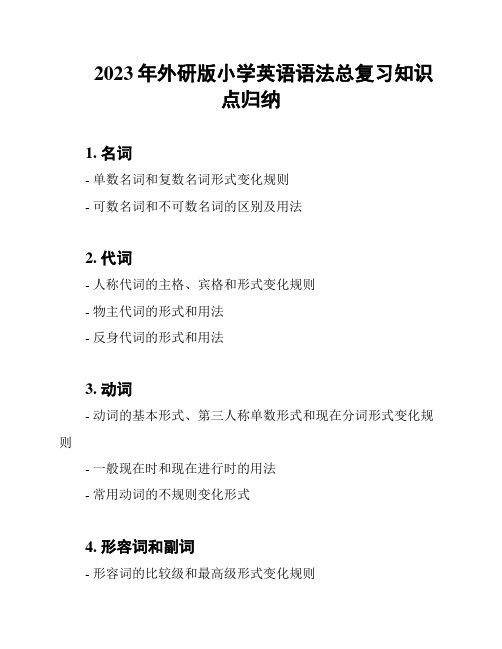
2023年外研版小学英语语法总复习知识
点归纳
1. 名词
- 单数名词和复数名词形式变化规则
- 可数名词和不可数名词的区别及用法
2. 代词
- 人称代词的主格、宾格和形式变化规则
- 物主代词的形式和用法
- 反身代词的形式和用法
3. 动词
- 动词的基本形式、第三人称单数形式和现在分词形式变化规则
- 一般现在时和现在进行时的用法
- 常用动词的不规则变化形式
4. 形容词和副词
- 形容词的比较级和最高级形式变化规则
- 副词的基本形式和比较级形式变化规则
- 形容词和副词的用法区别及常见词汇
5. 冠词
- 定冠词和不定冠词的用法和区别
6. 介词
- 常用介词的用法及搭配
- 介词短语的常见用法
7. 连词
- 并列连词的用法和连接两个主语、谓语或宾语- 从属连词的用法和连接主句和从句
8. 句型和句子结构
- 简单句的基本结构和常见句型
- 复合句的构成和常见句型
- 句子成分的基本分类和识别方法
9. 时态和语态
- 一般过去时、一般将来时和一般过去将来时的用法
- 被动语态的构成和用法
10. 反义疑问句和特殊疑问句
- 反义疑问句的构成和用法
- 特殊疑问词的用法及回答方式
11. 直接引语和间接引语
- 直接引语的转述和标点使用
- 间接引语的构成和变化
以上是2023年外研版小学英语语法总复的知识点归纳,希望能对你的研究有所帮助。
外研版小学英语册知识点复习及语法

外研版小学英语册知识点复习及语法一、词汇1.数字:从1到100的基础数字,以及相关的词汇如月份、星期几等。
2.常见名词:食物、动物、颜色、家庭成员等。
3. 动词:基本动词如be动词、have动词、go动词等,以及一些常见动作词如run、eat、drink等。
4.形容词:描述事物的特征,如大、小、高、矮、快、慢等。
5.副词:描述动作的方式,如慢慢地、快快地等。
6. 介词:表示方位、时间、原因等,如in、on、under、after等。
7. 代词:主要有人称代词如I、you、he、she等,以及物主代词如my、your、his、her等。
8.句型:句型是句子的基本组成部分,外研版小学英语教材注重句型的学习和练习。
常见的句型有疑问句、陈述句、肯定句、否定句等。
二、语法1. 一般现在时:用于描述事物的常态或经常性动作。
一般现在时的肯定句结构:主语 + 动词原形。
否定句结构:主语 + 动词原形 + not。
疑问句结构:助动词do/does + 主语 + 动词原形。
2. 一般过去时:用于描述过去发生的动作或状态。
一般过去时的肯定句结构:主语 + 动词过去式。
否定句结构:主语 + did not + 动词原形。
疑问句结构:Did + 主语 + 动词原形?3. 现在进行时:用于描述当前正在进行的动作。
现在进行时的肯定句结构:主语 + am/is/are + 动词-ing。
否定句结构:主语 +am/is/are + not + 动词-ing。
疑问句结构:Am/Is/Are + 主语 + 动词-ing?4. 一般将来时:用于描述将来要发生的动作。
一般将来时的肯定句结构:主语 + will + 动词原形。
否定句结构:主语 + will not/won't + 动词原形。
疑问句结构:Will + 主语 + 动词原形?5. 有动词的词组:外研版小学英语教材中还涉及到了一些有特定意义的动词词组,如can、could、shall、should等。
外研版小学英语~册知识点复习及语法精选版
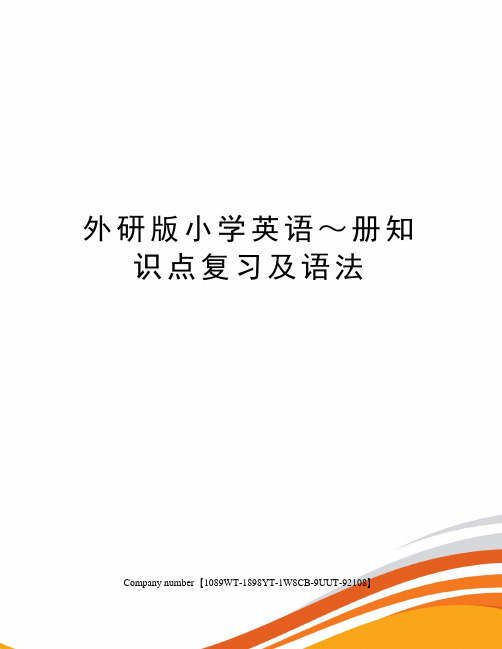
外研版小学英语~册知识点复习及语法Company number【1089WT-1898YT-1W8CB-9UUT-92108】外研版小学英语1~8册知识点复习及语法第1册主要内容1、26个字母(听、说、读、写过关):A B C D E F G H I J K L M N O P Q R S T U V W X Y Za b c d e f g h i j k l m n o p q r s t u v w x y z词汇:boy girl door window blackboard bird desk chair red blue yellow green black dog cat cap panda one two three four five six seven eight nine ten eleven twelve school teacher bag pencil pen book cake kite mother father grandpa grandma sister brother doctor driver policeman nurse farmer head arm leg foot nose eye mouth ear句子:1----Good morning! ----Good morning!2----Good afternoon! ----Good afternoon!3----How are you? ----I’m fine, thank you.4----What’s your name? ----I’m …. / My name is ….----Point to the door/window/blackboard…..----Stand up/ Sit down, please.----What colour… ----It’s red/blue….5----How many … ----One/Two/Three….6----What’s this/that----It’s a chair/desk…----Happy birthday! ----Thank you.---- Here’s your present/cake. ----Thank you.7----How old are you----I’m nine.8----Is it a cat----Yes, it is. / No, it isn’t.----Where’s the cat---I don’t know./ It’s in the green bag.9---- This is my father.----He/She’s a doctor/nurse…. \10---- This is his/ her arm/head….第2册主要内容词汇:song toy car ship doll animal monkey tiger lion elephant big small fat thin tall short sport football basketball table tennis riding bikes swimming skipping meat rice noodles fish milk banana pear orange apple Chinese Maths Science Music Art PE play sleep sing give eat Christmas spring summer autumn winter hot warm cool cold sunny windy dress coat sweater T-shirt bike bus walk in on under park词组:get up go to school have lunch go home watch TVgo to bed have breakfast have dinner Spring Festival New Year fly kites go to work by bus by bike go fishing句子:My favourite toy is a car/ doll….1 ----What’s this/that----It’s a tiger.2 ----What are they------ They’re lions.3 I like/ don’t like football/ basketball….I like/ don’t like swimming/skipping….4----Do you like meat----Yes, I do./ No, I don/t.5----Does Daming/he/ she like bananas-----Yes, he does./ No, she doesn’t.I get up at seven o’clock.----What’s the time, please---- It’s half past seven.----What do you do at the weekend ----- I play football.----What does he/she do at the weekend ---- He/ She watches TV.Happy New Year.It’s spring/ summer/ autumn/ winter.6 ---It’s warm/hot/cool/cold in spring/summer/ autumn/ winter.I’ve got a new book.7----Have you got a new book--- Yes, I have. / No, I haven’t.----Has Tom/he/she got a new book ----Yes, he/she has. / No, he/she hasn’t.8 ---Amy/ He/ She goes to school by bike/ by bus/by car.I t’s in/ on/ under the desk….第3-4册主要内容一、情境问答:第三册1. Have you got_______ Yes, I have. No, I haven’t.2. Excuse me. Where’s the________, please?Go straight on. Turn right. Turn left.3. What are you doing I’m _______What is he/she doing He’s/She’s ___________What are they doing They’re __________4. Do you want some _______ Yes, please. No, thank you.5. Can you _____Yes, I can. No, I can’t.6. What are you going to do I’m/We’re going to _______7. Can I have some ______Yes, you can. Sorry, you can’t.8. How many ____ are there in ____ There is/are______第四册9. Is it _____ Yes, it is. No, it isn’t.10. Will you _____ Yes, I will. No, I won’t.11. Was he/she/it _____ Yes, he/she/it was. No,he/she/it isn’t.Were you ______ Yes, I was. No, I wasn’t.12. Did you/he/she/they____ Yes, I/he/she/they did. No,I/he/she/they didn’t.二、词组短语第三册take pictures watch TV read a book make a cakewrite a letter listen to music talk to my friend do the high jumpplay with in the park look at do the long jumprow a boat under the tree play chessplay football play basketball play table tennis第四册have a picnic go swimming go to the park do homeworkspeak English情景运用:第三册1. 问路、指路Excuse me. Where’s the _______, please?Go straight on. / Turn left. / Turn right.2.询问对方正在做什么What are you doing I’m _______What is he/she doing He’s/She’s ___________What are they doing They’re __________3. 询问对方是否要吃某种食物Do you want some _______ Yes, please. No, thankyou.4. 询问对方的能力Can you _____Yes, I can. No, I can’t.5. 谈论将要做的事情What are you going to do? I’m/We’re going to _________ 6. 向别人要东西吃Can I have some ______Yes, you can. Sorry, you can’t.第四册7. 介绍某人This is_______8. 谈论周一至周日将要做的事What will you do on Monday? I’ll_______ on MondayWill you ______ on MondayYes, I will. No, I won’t.9. 做天气预报It will be hot/cold/sunny/windy. It will snow/rain.10. 做比较如: Sam is older than Daming.第5-6册主要内容e backst Sunday/night/year3.go home4.go to school5.go to the park6.hurry up7.in a hurry8.wait for9.make a list10.shopping list 11.half a kilo 12.how many 13.how much14.at the weekend 15.in the morning 16.in the afternoon17.take a photo18.take photos 19.the British Museum 20.Big Ben 21.the Great Wall22.the London Eye 23.give out 24.be careful 25.too many26.run fast27.play football 28.half past seven 29.get up 30.sitdown31.stand up 32.do morning exercises 33.play chess34.on the farm35.all day 36.of course 37.go out 38.say hello to 39.play basketball40.play table tennis 41.many years ago 42.ten years ago43.three days ago44. live in 45.a lot of=lots of 46.watch TV 47.howabout=what about48.talk about 49.foreign language 50.study/work hard 51.an English teacher52.a Chinese teacher 53.by bus/plane/car/train/ship/bike 54.English/ Chinese food 55.at school /.at home56.at the library57. library card 58.find out 59.be good at 60.look at61.have /has got62. in the east of China 63. in the west of China 64. in the south of China65. in the north of China 66.every year/day 67.send an email68. a good idea 69.listen to 70.be read for句子:1.Did your grandma learn English Yes, she did. /No, shedidn’t.2.What did she have for breakfast She had eggs and sausages.3.Where are the books about… They are on Shelf C.4.When did you go to… I went there in July.5.What about chopsticks It’s a good idea.6.Why don’t you give him a kite?7.8.Did you… Yes, I did. /No, I didn’t.9.When did you come back? We came back last Sunday.10.How many bananas do you want Six, please.11.How much chess do you want Half a kilo.12.Do you like… Yes, I do. /No, I don’t.13.Where did you go? We went to the British Museum.14.What did you do at the weekend We visited lots of places.15.What’s the matter?16.17.Whose bag is this? It’s Ling ling’s.18.Is this your cap Yes, it’s mine.19.There be+ 某物+某地18.Can you… Yes, I can. /No, I can’t.19. What time do you get upI get up at half past six.第7-8册主要内容第七册1.These postcards are great! It’s a picture of the Great Wall.Tell me more about the Great Wall. How long is it?2.3.There’s a Chinatown in New York! There are lots of Chineseshops and restaurants there.4.I’ve got lots of stamps. These are some stamps from Canada.This stamp is from China.5.Thanksgiving is my favourite festival. We always have aspecial meal.6.Can you speak English Can I write to your friend?7.Daming has got a Chinese kite and we fly it in the park. I’vegot some chopsticks, but they are difficult.8.Pandas eat for twelve hours a day.9.Do you often play with dolls Do you often clean your room?10.Do you want to visit the UN building in New York11.12.Don’t talk in the library. Please stand in line.第八册1.What do you want to eat I want a hot dog, please. How much isit2.It’s thirteen dollars and twenty-five cents.3.When are we going to eat We’re going to eat at half pasttwelve. It’s going to snow in Harbin.4.The sun is shining. The birds are singing in the trees. Theducks are eating our picnic.5.Who can help me Sorry, I can’t. I’m making Daming’sbirthday card. I can help you.6.Daming is having a birthday party. Daming is playing thetrumpet, but the phone is ringing.7.I brought you this book. Who gave it to you8.Simon’s family gave it to me.9.Shenzhou V flew into space with Yang Liwei. He spent abouttwenty-one hours in space. He made a video and now he is very famous.10.Helen Keller became blind and deaf. She couldn’t see and shecouldn’t hear. Later she could read and write. She wrote a book about herself.11.What’s the matter12.Why are you laughing13.Why are you wearing a raincoat14.Because it’s going to rain.15.Are you going to go to middle school this September Yes.I’m really excited. What are you going to study16.小学英语语法及习题一、名词复数规则1.一般情况下,直接加-s,如:book-books, bag-bags, cat-cats, bed-beds2.以s. x. sh. ch结尾,加-es,如:bus-buses, box-boxes, brush-brushes, watch-watches3.以“辅音字母+y”结尾,变y为i, 再加-es,如:family-families, strawberry-strawberries4.以“f或fe”结尾,变f或fe为v, 再加-es,如:knife-knives5.不规则名词复数:man-men, woman-women, policeman-policemen, policewoman-policewomen, mouse-micechild-children ,foot-feet, tooth-teeth,fish-fish, people-people, Chinese-Chinese, Japanese-Japanese写出下列各词的复数I _________him _________this ___________her ______watch_______child _______photo ________diary ______day________foot________ book_______ dress ________tooth_______ sheep______box_______ strawberry _____thief _______ peach______ sandwich ______man______ woman_______ paper_______juice___________ water________ milk________ rice__________tea__________二、一般现在时一般现在时基本用法介绍【No. 1】一般现在时的功能1.表示事物或人物的特征、状态。
2020年外研版小学英语语法总复习知识点归纳

2020年外研版小学英语语法总复习知识点归纳2020年外研版小学英语语法总复习知识点归纳1. 一般现在时用法:表示经常发生的动作或存在的状态例句:I go to school every day.2. 现在进行时用法:表示现在正在发生的动作例句:He is playing football now.3. 一般过去时用法:表示过去已经完成的动作或存在的状态例句:I watched a movie yesterday.4. 过去进行时用法:表示过去正在进行的动作例句:They were studying English last night.5. 一般将来时用法:表示将来要发生的动作或存在的状态例句:I will visit my grandparents next weekend.6. be动词用法:表示人或物的状态或特征例句:He is a student.第1页/共4页7. 一般现在时的否定句和疑问句用法:将be动词或助动词do改为否定形式或疑问形式例句:She is not here. Is he your teacher?8. there be句型用法:表示某地存在着某物或某人例句:There is a cat on the chair.9. 数词用法:表示数字例句:I have ten apples.10. 冠词用法:表示名词前的限定词例句:I have a dog.11. 代词用法:替代名词的词语例句:She is my friend. I like her.12. 介词用法:表示方向、位置、时间等例句:He is in the park.13. 物品名词的复数形式用法:根据单数名词的词尾变化加复数词尾-s或-es 例句:I have two books.14. 动词的ing形式用法:将动词原形加-ing例句:I am swimming.15. 动词原形的第三人称单数形式用法:一般加-s或-es例句:He reads books every day.16. 动词的过去式用法:一般加-ed或直接变化例句:She played football yesterday.17. 情态动词can用法:表示能力、许可或可能例句:Can you swim?18. 情态动词should用法:表示应该或建议例句:You should eat more vegetables.19. 情态动词must用法:表示必须或推测例句:You must do your homework.20. 情态动词have to用法:表示必须或需要例句:I have to go to school.21. 情态动词may用法:表示许可或可能例句:May I go to the bathroom?第3页/共4页22. 一般疑问句用法:将be动词或助动词提到主语前例句:Are you a student?23. 特殊疑问句用法:以特殊疑问词开头例句:What is your name?24. 简略答语用法:直接回答疑问句,省略重复的动词或助动词例句:Yes, I am.25. 形容词的比较级和最高级用法:在形容词后面加-er或-est例句:She is taller than me.以上是2020年外研版小学英语语法总复习的知识点归纳,希望对你有帮助。
外研社小学英语知识总结
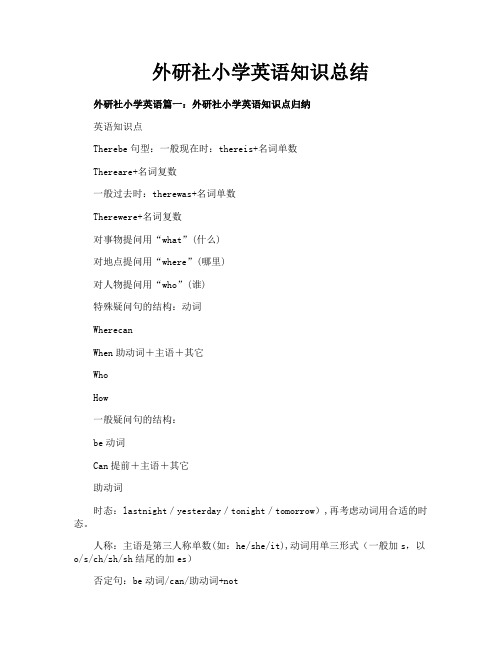
外研社小学英语知识总结外研社小学英语篇一:外研社小学英语知识点归纳英语知识点Therebe句型:一般现在时:thereis+名词单数Thereare+名词复数一般过去时:therewas+名词单数Therewere+名词复数对事物提问用“what”(什么)对地点提问用“where”(哪里)对人物提问用“who”(谁)特殊疑问句的结构:动词WherecanWhen助动词+主语+其它WhoHow一般疑问句的结构:be动词Can提前+主语+其它助动词时态:lastnight/yesterday/tonight/tomorrow),再考虑动词用合适的时态。
人称:主语是第三人称单数(如:he/she/it),动词用单三形式(一般加s,以o/s/ch/zh/sh结尾的加es)否定句:be动词/can/助动词+not+动词原形:can/will/助动词+动词原形动词的过去式:一般+ed特殊:is—was am---was are---were do—did learn---learntLive—lived teach—taught write---wrote give---gave buy—bought Have/has---had make---made go---went send—sent ride—rode study--studied反义词:small—big light—heavy easy—hard white—black new—broken good—bad名词复数:一般+s以s/o/sh/ch/zh结尾的+es特殊的:child—children短语:talkabout谈论关于howabout怎么样lookat看一看in the field在田地里 everyday每天 many years ago许多年以前 have got有 study hard努力学习 like doing喜欢做by bus乘坐公交车 lots of许多go to school去学校 at school在学校 giveto把给Vevry much非常be going to do将要做make a cake做蛋糕 sendto把发送到a good idea一个好主意putto把放在上 library card 图书卡 foreign language外语 as well又、还、也want的用法:want+名词想要want to do sth.想要做某事some与any的区别:some用于肯定句any用于否定句或疑问句外研社小学英语篇二:外研社小学英语按性质分类单词总汇外研社小学英语分类单词总汇一、动物(animal):bird鸟 bear熊 horse马 butterfly蝴蝶 parrot鹦鹉 kangaroo袋鼠 cat 猫 chameleon变色龙 dog狗 camel骆驼chick小鸡 dragon龙 duck鸭子elephant大象 fish鱼 frog青蛙 hen母鸡 lion狮子 monkey猴子 owl猫头鹰panda熊猫 tiger老虎 wolf狼二、人体器官(body):head头 eye眼睛 ear耳朵face脸 nose鼻子 mouth嘴 hair头发 shoulder 肩膀 arm胳膊 hand手 finger手指 leg大腿 knee膝盖 foot脚(feet复数)toe脚趾三、季节(season):spring春天 summer夏天 autumn秋天 winter冬天四、月份(month):January一月 February二月 March三月 April四月 May五月 June六月July七月 August八月 September九月 October十月 November十一月 December 十二月五、星期(week):Sunday星期日 Monday星期一 Tuesday星期二 Wednesday星期三 Thursday 星期四 Friday星期五 Saturday星期六六、职业(job/work):actor演员 doctor医生 driver司机 dancer舞蹈演员 farmer农民 postman 邮递员 firemen消防队员 teacher教师 nurse护士 policeman警察 taikonaut 宇航员七、家庭(family):Grandparent(外)祖父(母)grandfather(外)祖父grandmother(外)祖母grandchildren(外)孙子(女)parent父(母)亲father父亲mother(mum)母亲cousin表(堂)兄妹kid孩子brother哥(弟)sister姐(妹)son儿子uncle叔,伯,舅八、国家(county):China中国France法国America美国Spain西班牙Australia澳大利亚Canada加拿大England英格兰九、城市(city)及场所(place):Chinatown唐人街bedroom卧室classroom教室farm农场field田地flat公寓house家,房子station车站supermarket超市library图书馆restaurant饭店,旅馆school学校office办公室park公园playground操场,运动场seashore海岸,海滩square广场十、水果(fruit):apple苹果banana香蕉watermelon西瓜mango芒果orange橘子pear梨peach桃子grape葡萄十一、服装(clothes):T-shirt体恤衫cap帽子coat外套hat帽子dress连衣裙,女装shoe鞋子sweater毛线衫swimsuit游泳衣十二、单位:Kilometer千米,公里kilo千克,公斤metre米十三、动作(action):dancing跳舞drawing画jumping跳skipping跳绳swimming游泳shipping购物十四、交通工具:aeroplane直升飞机bike自行车train火车bus公共汽车boat小船dragonboat龙船ship轮船car小汽车lorry卡车plane飞机taxi出租车十五、节日(festival):SpringFestival春节Lanternfestival元宵节DragonBoatfestival端午节Mid-AutumnFestival中秋节FlagDay国旗日Christmas圣诞节十六、三餐:breakfast早餐lunch午餐dinner晚餐,正餐十七、食品(food):fastfood快餐biscuit饼干bread面包cake蛋糕sausage火腿coffee咖啡cheese奶酪cola可乐dumplings饺子egg鸡蛋fishandchips 鱼和薯条mooncake月饼spice香料,调料品ginger姜hotdog热狗sweets 糖果hamburger汉堡包icecream冰激凌jam果酱peanut花生juice果汁meat肉milk牛奶sandwich三明治noodles面条soup汤soybeanmilk豆浆tea茶toast烤面包vegetable蔬菜十八、日用品:bed床bag包,袋bell铃bottle瓶子box盒子building建筑物basket篮子clock钟表camera照相机cup杯子chopsticks筷子door门vase花瓶doorbell门铃light灯pan平底锅phone电话radio收音机table桌子toothbrush牙刷knife刀chair椅子table桌子TV电视机telephone电话television电视机fork叉十九、游戏及娱乐:balloon气球jigsaw拼图游戏computergames电脑游戏joke笑话kite风筝morningexercise早操popularmusic流行音乐project综合实践项目toy 玩具二十、疾病:cold感冒fever高烧headache头痛stomachache胃痛二十一、学科(subject):maths数学geography地理history历史music音乐PE体育science科学French法语English英语Chinese汉语二十二、宇宙事物及天气(weather):sky天空air空气wind风cloud云sun太阳sunshine阳光space太空rain雨snow雪二十三、学习用品::blackboard黑板book书desk课桌dictionary字典pen钢笔pencil铅笔ruler尺子bag书包二十四、人物(people):boy男孩girl女孩friend朋友child儿童(单)children儿童(复)lady女士,小姐man男人(单)men男人(复)queen女王pupil小学生woman女人(单)women女人(复)二十五、球类名词(ball):basketball篮球baseball棒球football足球tabletennis乒乓球二十六、乐器名词:flute笛子guitar吉他piano钢琴trumpet小号violin小提琴cup杯子chopsticks筷子door门vase花瓶doorbell门铃light灯二十七、数词(numbers)one(一)two(二)three(三)four(四)five(五)six(六)seven(七)eight(八)nine (九)ten(十)eleven(十一)twelve(十二)thirteen(十三)fourteen(十四)fifteen(十五)sixteen(十六)seventeen(十七)eighteen(十八)nineteen(十九)twenty(二十)thirty(三十)forty(四十)fifty(五十)sixty(六十)seventy(七十)eighty(八十)ninety(九十)hundred(百)first(第一)second(第二)third(第三)fourth(第四)fifth(第五)sixth(第六)seventh(第七)eighth(第八)ninth(第九)tenth(第十)eleventh(第十一)twelfth(第十二)twentieth(第二十)二十八、形容词(adj.)good(好的)big(大的)small(小的)long(长的)tall(高的)short(短的,矮的) young(年轻的)old(旧的,老的)strong(健壮的)thin(瘦的)active(积极活跃的)quiet(安静的)kind(和蔼亲切的)strict(严格的)smart(聪明的)funny(滑稽可笑的)tasty(好吃的)sweet(甜的)salty(咸的)sour(酸的)favourite(最喜爱的)fresh(新鲜的)clean(干净的)tired(疲劳的)excited(兴奋的)angry(生气的,愤怒的)happy(高兴的)sad(忧愁的,悲伤的)bored(无聊的,烦人的)taller(更高的)shorter(更矮的)stronger(更强壮的)older(年龄更大的)younger(更年轻的)bigger(更大的)heavier(更重的)longer(更长的)thinner(更瘦的)smaller(更小的)nice(好看的)fine(好的)great(很好的)heavy(重的)new(新的)fat(胖的)happy(快乐的)right(对的)hungry(饥饿的)cute(逗人喜爱的)little(小的)lovely(可爱的)beautiful(漂亮的)colourful(色彩鲜艳的)pretty(漂亮的)cheap(便宜的)expensive(昂贵的)juicy(多汁的)tender(嫩的)healthy(健康的)ill(有病的)helpful(有帮助的)high(高的)easy(简单的)proud(骄傲的)sick(有病的)better(更好的)higher(更高的)二十九、介词(prep.)in(在里)on(在上,在时候)under(在下面)near(在旁边)behind(在后面)nextto(与相邻)at(在点钟)by(经乘)for(为,给)to(朝,向)over(在上方)infrontof(在前面) 三十、代词(pron.)I(我)mewe(我们)usyou(你,你们)youhe(他)himshe(她)herit(它)itthey(他/她/它们)themmy(我的)mineour(我们的)oursyour(你的,你们的)yourshis(他的)hisher(她的)hersthis(这,这个)that(那,那个)三十一、动词(v.)work(工作)play(玩,踢)swim(游泳)skate(滑冰)fly(飞)jump(跳)walk(走)run(跑)climb(往上爬)fight(打架)swing(荡)eat(吃)sleep(睡觉)like(像,喜欢)have(有,吃)turn(转弯)buy(买)take(买,带)live(居住)teach(教)stop(停,停车站)wait(等)study(学习)learn(学习)sing(唱歌)dance(跳舞)row(划)dohomework(做作业)watchTV(看电视)readbooks(读书)cookthemeals(做饭)watertheflowers(浇花)sweepthefloor(扫地)cleanthebedroom(打扫卧室)makethebed(铺床)setthetable(摆饭桌)washtheclothes(洗衣服)dothedishes(洗碗碟)useacomputer(使用计算机)eatbreakfast(吃早饭)eatdinner(吃晚饭)domorningexercises(晨练,做广播操)gotoschool(上学)playsports(进行体育运动)getup(起床)haveEnglishclass(上英语课)climbmountains(爬山)playthepiano(弹钢琴)flykites(放风筝)makeasnowman(堆雪人)pla(转载于::外研社小学英语)nttrees(种树)drawpictures(画画)cookdinner(做饭)readabook(看书)answerthephone(接电话)listentomusic(听音乐)cleantheroom(打扫房间)writealetter(写信)writeane-mail(写电子邮件)drinkwater(喝水)takepictures(照相)watchinsects(观察昆虫)pickupleaves(采摘树叶)doanexperiment(做实验)catchbutterflies(捉蝴蝶)countinsects(数昆虫)collectinsects(收集昆虫)collectleaves(收集树叶)writeareport(写报告)playchess(下棋)haveapicnic(举行野餐)getto(到达)rideabike(骑自行车)playtheviolin(拉小提琴)makekites(制作风筝)collectstamps(集邮)goshopping(买东西)goswimming(去游泳)gofishing(去钓鱼)gohiking(去远足)goskiing(去滑雪)goice-skating(去滑冰)visitgrandparents(看望祖父母/外祖父母)meet(见面)welcome(欢迎)thank(谢谢)love(爱)drink(喝)taste(尝)smell(闻)feed(喂养)shear(剪)milk(挤奶)look(看)guess(猜)help(帮助)pass(传递)show(展示)use(使用)clean(打扫)open(打开)close(关上)put(放)read(读)write(写)paint(绘画)tell(告诉)kick(踢)bounce(反弹)ride(骑)find(寻找)drive(驾驶)fold(折)send(寄)wash(洗)shine(照耀)become(变成)feel(感觉到)think(思考)fall(落下)leave(离开)wakeup(醒来)puton(穿上)takeoff(脱掉)hangup(挂起)wear(穿)gohome(回家)gotobed(上床睡觉)playcomputergames(玩电脑游戏)dohousework(做家务)emptythetrash(倒垃圾)putawaytheclothes(收拾衣服)getoff(下车)takeatrip(去旅行)readamagazine(阅读杂志)gotothecinema(去看电影)三十二、其他(others)day(天,日子)today(今天)date(日期)yes(是,是的)no(不,不是)not(不,不是的)o'clock(点钟)time(时间)here(这儿,这里)there(那儿,那里)very(很,非常)but(但是)then(然后)and(和)too(也,太)nextweek(下周)last(上一个,仅余的,留在最后的)noon(中午)evening(夜晚,晚上)please(请)usually(通常,一般)often(经常)sometimes(有时候)hobby(兴趣,爱好)best(最,极)because(因为)straightly(成直线地)birthday(生日)traffic(交通)trafficlight(交通灯)trafficrule(交通规则)matter(事情,麻烦)should(应该)comefrom(从来,来自)thismorning(今天上午)thisafternoon(今天下午)thisevening(今天晚上)三十三、动词的第三人称单数形式watch—watchesteach—teacheswash—washesgo—goesdo—doeshave—hasread—readslive—lives外研社小学英语篇三:(外研社版)小学英语语法大全(外研社版)小学英语语法大全第一章名词一、定义名词是表示人或事物名称的词。
外研版小学英语语法总复习知识点归纳

外研版小学英语语法总复习知识点归纳一、时态1.一般现在时(1)表示经常发生的动作或事情,通常用“usually通常,often常常,every, 每,,sometimes有时,always总是,”等词。
(2)基本结构:主语I/You/We/They/He/She/It肯定句:主语+动词原形或动词第三人称单数形式否定句:主语+don’t+动词原形或者doesn’t+动原一般疑问句(Yes/No)Do,?Yes,Ido.No,Idon’t.Does,(动词原形),?Yes,he/shedoes.No,he/shedoesn’t.特殊疑问句Whatdo,?Howdoesshe,(动词原形),?(3)动词第三人称单数形式(同名词单数变成复数方法相同)1.一般情况+s如:walk-walks2.辅音字母+y结尾去y+iesfly-flies3.结尾是s,x,sh,ch+eswatch-watches4.结尾是0+esdo-does,go-goes5.特殊have-has2.现在进行时(1)表示正在发生的动作,通常用“now现在,look看,linsen听”.(2)基本形式:be+动词-ingeg:Iam(not)doingmyhomework.You/We/Theyare(not)reading.He/She/Itis(not)eating.Whatareyoudoing?Ishereading?(3)动词的现在分词形式(动词+ing)一般情况+ingwalk—walking结尾是不发音的e-e+ingcome—coming重读闭音节双写最后一个字母+ing swim-swimmingrun-running3.一般过去时(1)表示过去已经发生的事情,通常用“last,上一个,,justnow刚才, manyyearsago许多年前,yesterday昨天”等词。
(2)be动词的过去式:am/is—wasare—were(3)过去式基本结构肯定句:主语+动词过去式Iwentshoppinglastnight.否定句:主语+didn’t+动词原形Ididn’tgoshoppinglastnight.一般疑问句(Yes/No)Did,+动词原形,?Didyougoshoppinglastnight?特殊疑问句(wh-)Whatdid,+动词原形,?Whatdidyoudolastnight?(4)动词过去式的变化:规则动词的变化:(1)一般动词+edplanted,watered,climbed(2)以不发音的e结尾+dlikedtied(3)辅音字母加y结尾-y+iedstudy—studied,cry-cried(4)重读闭音节单词,末尾只有一个辅音字双写最后一个字母+edplan–plannedstop–stopped不规则动词的变化:原形过去式原形过去式原形过去式am/iswasareweregowentdodidfindfoundbuyboughteatatefeelfeltdrinkdrankteachtaughttaketookreadreadgivegavehavehadputputsingsangdrivedrovemeetmetcutcutbeginbeganmakemadeletletringrangwritewroteseesawrunranriderodecomecamedrawdrewsitsattelltoldlearnlearntgetgotcarrycarriedstudystudied4.一般将来时一般将来时表示将来打算做的事或将要发生的事情。
2020年外研版小学英语语法总复习知识点归纳

2020年外研版小学英语语法总复习知识点归纳小学英语语法总复一、时态1.一般现在时表示经常发生的动作或事情,通常使用“usually。
often。
every…。
sometimes。
always”等词。
基本结构:肯定句:主语+动词原形否定句:主语+don’t/doesn’t+动词原形一般疑问句:Do/Does+主语+动词原形?Yes,主语+do/does。
No,主语+don’t/doesn’t.特殊疑问句:Wh-+do/does+主语+动词原形?注意:动词第三人称单数形式要加-s或-es。
以辅音字母+y结尾的动词变成第三人称单数形式,先变-y为-i,再加-es。
以-s。
x。
sh。
ch结尾的动词变成第三人称单数形式,要加-es。
特殊动词do。
have。
go的第三人称单数形式分别为does。
has。
goes。
2.现在进行时表示正在发生的动作,通常使用“now。
look。
listen”等词。
基本形式:be+动词的-ing形式肯定句:主语+am/is/are+动词的-ing形式否定句:主语+am/is/are+not+动词的-ing形式一般疑问句:Am/Is/Are+主语+动词的-ing形式?Yes,主语+am/is/are。
No,主语+am/is/are+not.特殊疑问句:Wh-+be+主语+动词的-ing形式?注意:动词的-ing形式一般为动词原形+ing,但以不发音的-e结尾的动词只需加-ing,以重读闭音节结尾的动词双写最后一个字母再加-ing。
3.一般过去时表示过去已经发生的事情,通常使用“last…。
just now。
a moment ago。
yesterday”等词。
过去式基本结构:肯定句:主语+动词的过去式否定句:主语+didn’t+动词原形一般疑问句:Did+主语+动词原形?Yes,主语+did。
No,主语+didn’t.特殊疑问句:Wh-+did+主语+动词原形?注意:be动词的过去式为was/were。
外研版小学英语语法总复习知识点归纳
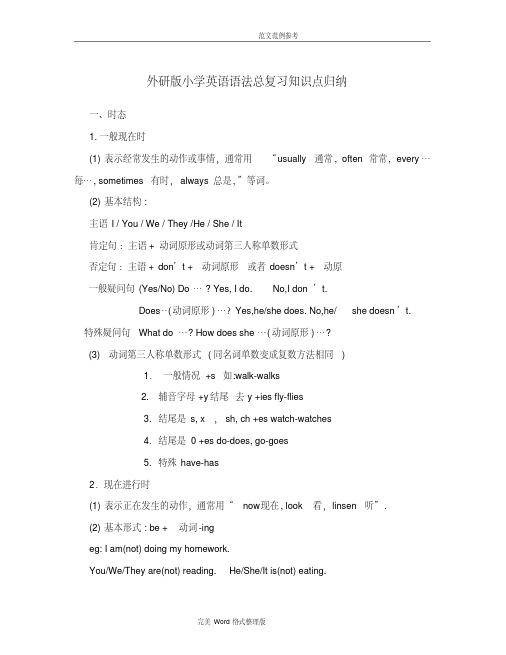
外研版小学英语语法总复习知识点归纳一、时态1.一般现在时(1)表示经常发生的动作或事情,通常用“usually通常, often常常, every…每…, sometimes有时,always总是,”等词。
(2)基本结构:主语I / You / We / They /He / She / It肯定句:主语+ 动词原形或动词第三人称单数形式否定句:主语+ don’t + 动词原形或者doesn’t + 动原一般疑问句(Yes/No) Do… ? Yes, I do. No,I don’t.Does…(动词原形)…? Yes,he/she does. No,he/she doesn’t.特殊疑问句What do …? How does she…(动词原形)…?(3) 动词第三人称单数形式(同名词单数变成复数方法相同)1.一般情况 +s 如:walk-walks2. 辅音字母+y结尾去y +ies fly-flies3. 结尾是 s, x, sh, ch +es watch-watches4. 结尾是0 +es do-does, go-goes5. 特殊 have-has2.现在进行时(1)表示正在发生的动作,通常用“now现在, look看,linsen听”.(2)基本形式: be + 动词-ingeg: I am(not) doing my homework.You/We/They are(not) reading. He/She/It is(not) eating.What are you doing? Is he reading?(3)动词的现在分词形式(动词+ing)一般情况 +ing walk—walking结尾是不发音的 e -e + ing come—coming 重读闭音节双写最后一个字母+ing swim-swimming run-running3. 一般过去时(1) 表示过去已经发生的事情,通常用“last …上一个…, just now刚才, many years ago许多年前, yesterday昨天”等词。
完整word版)外研版小学英语语法总复习知识点归纳

完整word版)外研版小学英语语法总复习知识点归纳n:This article discusses the basic grammar rules of English tenses。
including the present simple tense。
present continuous tense。
and past simple tense。
Each tense is explained with its basic structure。
usage。
and examples.Present Simple XXX:The present simple tense is used to XXX such as "usually," "often," "every," "sometimes," and "always" are commonly used with this tense。
The basic structure of this tense is subject + verb (in base form or third-person singular form).For example:I usually walk to work.She always XXX.They never watch TV in the morning.The negative form of this tense is subject + don't/doesn't + verb (in base form or third-person singular form)。
The interrogative form is formed by using do/does + subject + verb (in base form or third-person singular form).Present Continuous XXX:XXX XXX such as "now," "look," and "listen" are commonly used with this tense。
2020年外研版小学英语语法总复习知识点归纳

2020年外研版小学英语语法总复习知识点归纳2020年外研版小学英语语法总复习知识点归纳一、单数名词和复数名词的变化规则:1. 一般情况下,单数名词变复数,直接在名词后面加s。
例:book-books, table-tables2. 以s, sh, ch, x结尾的名词,变复数时加es。
例:bus-buses, brush-brushes, box-boxes3. 以辅音字母+y结尾的名词,变复数时把y变为i,再加es。
例:baby-babies, strawberry-strawberries4. 以元音字母+y结尾的名词,变复数时直接加s。
例:boy-boys, day-days5. 以f或fe结尾的名词,变复数时变f或fe为v再加es。
例:leaf-leaves, knife-knives6. 以o结尾的名词,变复数时大部分加s,少部分加es。
例:photo-photos, potato-potatoes7. 一些特殊的名词变复数时有特殊规则,例如:man-men, woman-women, tooth-teeth, foot-feet等。
二、形容词和副词的比较级和最高级形式:第1页/共6页1. 一般情况下,单音节形容词和副词比较级在词尾加er,最高级在词尾加est。
例:big-bigger-biggest, fast-faster-fastest2. 以e结尾的单音节形容词和副词,比较级和最高级在词尾加r和st前先去掉e。
例:nice-nicer-nicest, late-later-latest3. 以重读闭音节词尾只有一个辅音字母的双音节形容词和副词,比较级和最高级在词尾加er和est。
例:thin-thinner-thinnest, fat-fatter-fattest4. 以辅音字母+y结尾的形容词和副词,变比较级时把y变为i再加er,变最高级时把y变为i再加est。
例:heavy-heavier-heaviest, happy-happier-happiest5. 形容词和副词变比较级和最高级时有规则变化的有:good-better-best, bad-worse-worst, much-more-most, little-less-least, far-further-furthest等。
2015-2016学年度外研版小学英语语法总复习知识点归纳(可编辑修改word版)

小学英语语法总复习一、时态1.一般现在时(1)表示经常发生的动作或事情,通常用“usually通常, often 常常, every…每…, sometimes 有时,always 总是,”等词。
(2)基本结构:2.现在进行时,(1)表示正在发生的动作,通常用“now现在, look 看,linsen 听”.(2)基本形式:be + 动词-ingeg: I am(not) doing my homework.You/We/They are(not) reading.He/She/It is(not) eating.What are you doing?Is he reading?(3)3.一般过去时(1)表示过去已经发生的事情,通常用“last…上一个…, just now 刚才, a moment ago 刚才,yesterday 昨天”等词。
(2)be 动词的过去式: am/is—was are—were(4)词过去式的变化:不规则动词的变化:原形过去式原形过去式原形过去式原形过去式sweep swept teach taught have had go went keep kept think thought do did find found sleep slept buy bought eat ate say saidfeel felt drink drank is/am was take tookread read give gave are were mean meantput put sing sang drive drove meet metcut cut begin began speak spoke make madelet let ring rang write wrote see sawfly flew run ran ride rode come came draw drew sit sat hear heard tell toldgrow grew learn learned/ learnt get got know knew4.一般将来时一般将来时表示将来打算做的事或将要发生的事情。
外研版小学英语语法总复习知识点归纳[1]
![外研版小学英语语法总复习知识点归纳[1]](https://img.taocdn.com/s3/m/0de7bedf5727a5e9846a618e.png)
外研版小学英语语法总复习知识点归纳(word版可编辑修改)编辑整理:尊敬的读者朋友们:这里是精品文档编辑中心,本文档内容是由我和我的同事精心编辑整理后发布的,发布之前我们对文中内容进行仔细校对,但是难免会有疏漏的地方,但是任然希望(外研版小学英语语法总复习知识点归纳(word版可编辑修改))的内容能够给您的工作和学习带来便利。
同时也真诚的希望收到您的建议和反馈,这将是我们进步的源泉,前进的动力。
本文可编辑可修改,如果觉得对您有帮助请收藏以便随时查阅,最后祝您生活愉快业绩进步,以下为外研版小学英语语法总复习知识点归纳(word版可编辑修改)的全部内容。
外研版小学英语语法总复习知识点归纳一、时态1.一般现在时(1)表示经常发生的动作或事情,通常用“usually通常, often常常,every…每…, sometimes有时,always总是,”等词。
(2)基本结构:主语I / You / We / They /He / She / It肯定句:主语+ 动词原形或动词第三人称单数形式否定句:主语+ don’t + 动词原形或者doesn’t + 动原一般疑问句(Yes/No) Do… ? Yes, I do。
No,I don't.Does…(动词原形)…? Yes,he/she does. No,he/she doesn’t。
特殊疑问句What do …? How does she…(动词原形)…?(3)动词第三人称单数形式(同名词单数变成复数方法相同)1.一般情况 +s 如:walk-walks2. 辅音字母+y结尾去y +ies fly-flies3。
结尾是 s, x, sh, ch +es watch—watches4. 结尾是0 +es do—does, go—goes5. 特殊 have-has2.现在进行时(1)表示正在发生的动作,通常用“now现在, look看,linsen听”。
外研版小学英语语法总复习

小学英语语法总复习一、时态1.一般现在时(1)表示经常发生的动作或事情,通常用“usually通常, often常常, every…每…, sometimes有时,always总是,”等词。
(2)基本结构:I / You / We / They He / She / It肯定句动词原形动词第三人称单数形式否定句don’t + 动原doesn’t + 动原一般疑问句(Yes/No) Do… ? Yes, I do.Does…(动词原形)…?No,she doesn’t.特殊疑问句What do …?How does she…(动词原形)…?(3) 动词第三人称单数形式(同名词单数变成复数方法相同)1 一般情况+s 如:walk-walks2. 辅音字母+y结尾去y +ies fly-flies3. 结尾是s, x,sh, ch +es watch-watches4. 特殊的do-does ,have-has, go-goes2.现在进行时(1)表示正在发生的动作,通常用“now现在, look看,listen听”.(2)基本形式:be + 动词ingeg: I am(not) doing my homework.You/We/They are(not) reading.He/She/It is(not) eating.What are you doing?Is he reading?(3)动词的现在分词形式(动词+ing)一般情况+ing walk—walking结尾是不发音的 e -e + ing come—coming重读闭音节双写最后一个字母+ing run-running swim-swimming3. 一般过去时(1)表示过去已经发生的事情,通常用“last …上一个…, just now刚才, a moment ago刚才,yesterday昨天”等词。
(2)be 动词的过去式: am/is—was;are—were(3)过去式基本结构肯定句(Positive)动词过去式I went shopping last night.否定句(Negative) Didn’t + 动词原形I didn’t go shopping last night.一般疑问句(Yes/No)Did …+ 动词原形…?Did you go shopping last night?特殊疑问句(wh-) What did…+ 动词原形…?What did you do last night?(4)词过去式的变化:规则动词的变化:一般动词+ed planted, watered, climbed以不发音的e结尾+d liked辅音字母加y结尾-y+ ied study—studied, cry- cried重读闭音节单词,末尾只有一个辅音字母双写最后一个字母+edstop –stoppedplan - planned不规则动词的变化:原形过去式原形过去式原形过去式原形过去式sweep swept teach taught have had go went keep kept think thought do did find found sleep slept buy bought eat ate say said feel felt drink drank is/am was take took read read give gave are were mean meant put put sing sang drive drove meet met cut cut begin began speak spoke make made let let ring rang write wrote see sawfly flew run ran ride rode come camedraw drew sit sat hear heard tell toldgrow grew learn learned/ learnt get got know knew4.一般将来时一般将来时表示将来打算做的事或将要发生的事情。
外研版小学英语语法总复习

小学英语语法总复习一、时态1.一般现在时(1)表示经常发生的动作或事情,通常用“usually通常, often常常, every…每…, sometimes有时,always总是,”等词。
(2)基本结构:I / You / We / They He / She / It肯定句动词原形动词第三人称单数形式否定句don’t + 动原doesn’t + 动原一般疑问句(Yes/No)Do… ? Yes, I do.Does…(动词原形)…?No,shedoesn’t.特殊疑问句What do …?How does she…(动词原形)…?(3) 动词第三人称单数形式(同名词单数变成复数方法相同)1一般情况+s如:walk-walks2.辅音字母+y结尾去y +ies fly-flies3.结尾是 s, x, sh, ch+es watch-watchesdo-does ,have-has,4.特殊的go-goes2.现在进行时(1)表示正在发生的动作,通常用“now现在, look看,listen听”.(2)基本形式: be + 动词ingeg: I am(not) doing my homework.You/We/They are(not) reading.He/She/It is(not) eating.What are you doing?Is he reading?(3)动词的现在分词形式(动词+ing)一般情况+ing walk—walking 结尾是不发音的 e-e + ing come—coming重读闭音节双写最后一个字母+ing run-running swim-swimming3. 一般过去时(1)表示过去已经发生的事情,通常用“last …上一个…, just now刚才, a moment ago刚才, yesterday昨天”等词。
(2)be 动词的过去式: am/is—was;are—were(3)过去式基本结构肯定句(Positive)动词过去式I went shopping last night.否定句(Negative)Didn’t + 动词原形I didn’t go shopping lastnight.一般疑问句(Yes/No)Did …+ 动词原形…?Did you go shopping lastnight?特殊疑问句(wh-)What did…+ 动词原形…?What did you do last night?(4)词过去式的变化:规则动词的变化:一般动词+ed planted, watered, climbed 以不发音的e结尾+d liked辅音字母加y结尾-y+ ied study—studied, cry- cried重读闭音节单词,末尾只有一个辅音字母双写最后一个字母+edstop –stoppedplan - planned不规则动词的变化:原形过去式原形过去式原形过去式原形过去式sweep swept teach taught have had go went keep kept think thought do did find found sleep slept buy bought eat ate say said feel felt drink drank is/am was take took read read give gave are were mean meant put put sing sang drive drove meet met cut cut begin began speak spoke make made let let ring rang write wrote see saw fly flew run ran ride rode come came draw drew sit sat hear heard tell toldlearned/get got know knew grow grew learnlearnt4.一般将来时一般将来时表示将来打算做的事或将要发生的事情。
- 1、下载文档前请自行甄别文档内容的完整性,平台不提供额外的编辑、内容补充、找答案等附加服务。
- 2、"仅部分预览"的文档,不可在线预览部分如存在完整性等问题,可反馈申请退款(可完整预览的文档不适用该条件!)。
- 3、如文档侵犯您的权益,请联系客服反馈,我们会尽快为您处理(人工客服工作时间:9:00-18:30)。
外研版小学英语语法总复习知识点归纳一、时态1.一般现在时(1)表示经常发生的动作或事情,通常用“usually通常, often常常, every…每…, sometimes有时,always总是,”等词。
(2)基本结构:主语I / You / We / They /He / She / It肯定句:主语+ 动词原形或动词第三人称单数形式否定句:主语+ don’t + 动词原形或者doesn’t + 动原一般疑问句(Yes/No) Do… ? Yes, I do. No,I don’t.Does…(动词原形)…? Yes,he/she does. No,he/she doesn’t.特殊疑问句What do …? How does she…(动词原形)…?(3) 动词第三人称单数形式(同名词单数变成复数方法相同)1.一般情况 +s 如:walk-walks2. 辅音字母+y结尾去y +ies fly-flies3. 结尾是 s, x, sh, ch +es watch-watches4. 结尾是0 +es do-does, go-goes5. 特殊 have-has2.现在进行时(1)表示正在发生的动作,通常用“now现在, look看,linsen听”.(2)基本形式: be + 动词-ingeg: I am(not) doing my homework.You/We/They are(not) reading. He/She/It is(not) eating.What are you doing? Is he reading?(3)动词的现在分词形式(动词+ing)一般情况 +ing walk—walking结尾是不发音的 e -e + ing come—coming 重读闭音节双写最后一个字母+ing swim-swimming run-running3. 一般过去时(1) 表示过去已经发生的事情,通常用“last …上一个…, just now刚才, many years ago许多年前, yesterday昨天”等词。
(2) be 动词的过去式: am/is—was are—were(3)过去式基本结构肯定句:主语+ 动词过去式I went shopping last night.否定句:主语 + d idn’t + 动词原形I didn’t go shopping last night.一般疑问句(Yes/No)Did …+ 动词原形…?Did you go shopping last night?特殊疑问句(wh-) What did…+ 动词原形…?What did you do last night?(4)动词过去式的变化:规则动词的变化:(1)一般动词 +ed planted,watered,climbed(2) 以不发音的e结尾 +d liked tied(3)辅音字母加y结尾 -y+ ied study—studied, cry- cried(4)重读闭音节单词,末尾只有一个辅音字双写最后一个字母+edplan – planned stop –stopped不规则动词的变化:原形过去式原形过去式原形过去式am /is was are were go wentdo did find found buy boughteat ate feel felt drink drankteach taught take took read readgive gave have had put putsing sang drive drove meet metcut cut begin began make madelet let ring rang write wrotesee saw run ran ride rodecome came draw drew sit sattell told learn learnt get gotcarry carried study studied4.一般将来时一般将来时表示将来打算做的事或将要发生的事情。
常常与tomorrow, next Sunday 等时间状语连用。
结构:be going to +动词原形或will +动词原形例如:I’m going to visit my grandpa next week.二、人称代词主格 I we you he she it they宾格 me us you him her it them形容词性物主代词 my our your his her its their名词性物主代词 mine ours yours his hers its theris(注:介词,动词后面跟宾格。
后面没有名词时用名词性物主代词。
)三、可数名词的复数形式1.一般名词: + s book –books2.辅音字母加y结尾: - y+ ies story—stories3.以s, x,sh, ch ,结尾: + es glass—glasses; a watch-watches以o结尾:1)有生命的 +es potato-potatoes2) 无生命的 +s photo-photoes4.以f或fe结尾: - f 或fe 变为ves knife –knives; shelf-shelves5.特殊的名词复数:man-men, woman-women, policeman-policemen, policewoman-policewomen, mouse-mice, child-childrenfoot-feet,.tooth-teethfish-fish, people-people, Chinese-Chinese,四、不可数名词(没有复数形式)bread, rice, water, juice,milk,tea,coffee五、缩略形式I’m = I am you’re = you are she’s = she is he’s = he is hasn’t = he has(got) it’s = it is who’s =who iscan’t =can not isn’t=is no t didn’t=did notweren’t=were not wasn’t=was not let’s=let usI’ll=I will六、a. an .the的用法1.单词的第一读音是辅音读音:a book, a peach, a “U” 单词的第一个读音是元音读音:an egg, an hour,an “F” 2.the要注意的:球类前面不加the,play football乐器前面要加the,play the piano序数词前面要加the, the second七、介词1.表示方位:on, in ,in front of, between, next to, near, beside, at,behind.,under2.表示时间:(1)at : 几点前面用at如:at six o’clock, 没有day的节日前用at如 :at Christmas, 固定词组 at the weekends ,at night(2)on: 用于星期,日期,某一天的上午、下午、晚上(指具体的某一天时)on Sunday在星期天 on Sunday morning 在星期天的上午 on March 8 在3月8日; 带有Day的节日前用on 如: on National Day(3)in: 早晨,中午,晚上前用in:in the morning ,in the afternoon ,in the evening ,月份前用in ,如in December ;季节前用in ,如 winter;年份前用 in,如 in 1999八、基数词变成序数词的方法1. 直接在基数词词尾加上th。
如:seventh第七,tenth 第十,thirteenth 第十三,2.以y结尾的基数词,变y为i,再加上eth。
如:twentieth 第二十。
3.不规则的。
如:first 第一, second 第二, third 第三,fifth 第五, eighth 第八,ninth 第九,twelfth 第十二。
4.有两个或以上单词组成的基数词只改最后一个单词如twenty-first 第二十一。
九、some /any的用法1.肯定句中用some:I have some toys in my bedroom.2.问句和否定句中用any:Do you have any brothers or sisters?He hasn’t got any pencils in his pencil-case.3.询问想要什么时用some:Would you like some juice?Can I have some stamps?十、 there be结构1.肯定句(有…): There is +单数或不可数名词There are +复数注:遵循就近原则,看靠there be最近的2.一般疑问句(有…吗,):Is t here …? Yes, there is./ No, there isn’t.Are there…? Yes, there are. /No, there aren’t.3.否定句(没有): There isn’t …. There aren’t….4.there be句型与have(has) 的区别:there be 表示在某地有某物(或人);have(has) 表示某人拥有某物。
十一、祈使句Sit down please.Don’t open the door, please.Let’s go to the park.(注:祈使句中动词用原形)十二、(情态)动词can, may, must, should, will后面直接用动词原形。
1. I / He / She / They can sing.May I come in?I must go now.2. You should be quiet in the library.3. You’ll be good friends. 十四、特殊疑问句1.What 什么(问什么事,什么物或什么工作等)What are you doing, I’m reading.What did you do yesterday? I played basketball.What are you going to do? I’m going to do homework.What is that? It’s a book.What does he/she do? She’s a nurse.What time is it? It’s seven.2. What colour 问颜色What colour is your coat? It’s red.3.when 什么时候When do you get up? I get up at six thirty.When is your birthday? It’s on the 21st of December.4.Which哪一个Which is your watch, the yellow one or the white one?The yellow is mine.5.Who谁Who is the man with a big nose? He’s my uncle.6.Whose谁的Whose bag is it? It’s his bag.7.Where哪里Where is my pen? It’s under the book.8.Why为什么Why do you like summer? Because… 9.How many 多少How many books are there in the school bag? There are four books in the school bag.10. How old 几岁How old is the young man? He’s nineteen.11.How much多少钱How much is the toy bear? It’s eleven yuan.12.How 怎么样(How long/ big/tall?)How do you go to school everyday? I go to school by car.How long is the river? It’s 10 miles long.十五.已经学过的动词say help know lost live readrun take listen talk see draw jump sing dance want make buyhelp give climb visit get answerlearn take fly have cook phonewash sing go eat tell travelcome fall find ride carry likeswim pass play skip watch flyopen put meet wait send need take wear catch use feel smellshout work put take get bring speak sit down stand up find outturn right turn left go straight go to school公司档案管理制度一、总则1、为加强本公司档案工作,充分发挥档案作用,全面提高档案管理水平,有效地保护及利用档案,为公司发展服务,特制定本制度。
